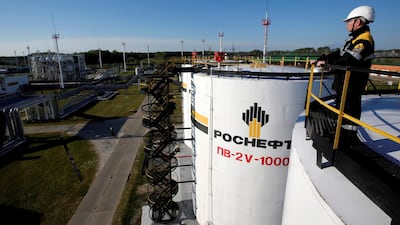Russia’s return to the G7 (or G8) group of leading developed nations was suggested by Donald Trump, via tweet, on Friday.
Excluded over its annexation of Crimea, Moscow’s return to this grouping looks unlikely. But with last week’s signature of a strategic cooperation agreement with the UAE, Russia has upped its game in the Arabian Gulf.
As Dorel Iosif and I contend in a new report, Russia’s relations in the Middle East are more opportunistic and tactical as it navigates a contradictory archipelago of contending states and interests. Its position in Asia is more consistent and strategic but, ultimately, more perilous for it.
Alongside its military and diplomatic heft, energy is one of the northern giant’s strongest tools as it is the world’s largest gas exporter and one of the top three oil producers. It uses its oil, gas and nuclear power to advance both in the Middle East and in East Asia, even as these two regions increasingly interlock in a complicated triangle.
Russia has proved adept at playing all sides. It backs Bashar Al Assad’s genocidal regime in Syria, supports Iran against US sanctions, expands gas sales to Turkey, engages with strongmen in Egypt and Libya, advances money to the Kurdistan region of Iraq in support of an independence bid, and invites investment from Saudi Arabia and the UAE on the one side, and Qatar on the other.
The Russian accord with the UAE, signed on June 1, aims at stability in the global oil and gas market, alongside defence cooperation and joint projects. It came shortly after Mubadala’s May 24 joint venture to develop Siberian fields with Gazprom Neft. Western sanctions have left Russia keen to find capital for domestic energy developments from China, India and the Middle East.
Russian influence in the region and worldwide has been enhanced by its cooperation with Opec, essential to allow the expanded group to cut production and boost oil prices without fear of losing too much market share.
Rosatom has also laid down a regional marker by finishing Iran’s first civil nuclear power plant, at Bushehr, signing initial deals for reactor construction with Saudi Arabia, Egypt and Jordan, and constructing a nuclear power plant at Akkuyu in Turkey, due for completion in 2023. Russia thus gives regional countries an alternative to the US, whose aid comes with many strings attached.
_______________
Read more:
Business Extra podcast: Russia, Saudi Arabia and the state of oil markets
Shipping industry is gearing to adopt cleaner fuels by 2020
_______________
In these ventures, Russian companies have often been driven by commercial considerations. Its political moves have been opportunistic, advancing forward into a vacuum left by US reluctance and confusion and the unreadiness, so far, of China to take a leading role. The Kremlin does not intend to confront the US head-on. The contradictions of dealing with every Middle East power simultaneously make Moscow influential and impossible to ignore, but leave it without natural regional allies. There is always the suspicion that a chip in the Middle East might be traded for some more important Russian interest in Europe or the Far East.
In East Asia, by contrast, elements of a Russian grand strategy are more apparent. Its East Siberia Pacific Ocean pipeline has made it a direct competitor with Middle East exporters for the Chinese and other oil markets. Its planned Power of Siberia pipeline, although very expensive, enables it to tap into the suddenly flowering Chinese gas market and present an implicit, though not very plausible, threat to shift supplies away from Europe.
Liquefied natural gas plants in Yamal, using the newly-melting Arctic sea route to Asia, and the Far Eastern island of Sakhalin give other export options. Détente on the Korean peninsula might even allow a gas pipeline through the North to South Korea. The authoritarian, state capitalist models of Beijing and Moscow also align.
Yet Russia’s Far Eastern federal district, two-thirds the area of China, has a population of only 6.3 million. Siberia in general is rich in oil, gas, hydropower, timber and minerals, but there is always a sense of vulnerability to its heavily-populated neighbour. From Moscow’s vantage point, development and repopulation of this remote area is vital but unaffordable.
China’s Belt and Road Initiative, with strong energy-focused elements including pipelines, maritime transit and electricity connections, also competes in traditional Russian areas of influence in the oil-rich states of Central Asia. China, not Russia, is the key trade partner for Iran and will be even more so as the renewed US sanctions bite.
For Middle East states, Russia’s importance has grown greatly over the past decade. Its geographic, diplomatic and military reach make it useful, its lack of firm alliances and principles make it flexible, and its energy resources lead naturally to both cooperation and competition.
But its partners need, too, to be acutely aware of Moscow’s weaknesses and contradictions.
Robin M. Mills is CEO of Qamar Energy, and author of The Myth of the Oil Crisis


